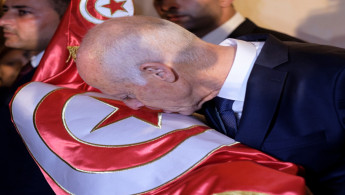Fake, 'sock puppet' social media accounts attempting to steer narrative on Tunisia crisis: analyst
A wave of social media propaganda and misinformation originating from the Gulf has hit Tunisia, analysts say, as regional actors vie for control over the narrative of the country’s current political crisis.
Social media data and conversations point to concerted efforts by Gulf-based influencers to skew the narrative in favour of Tunisian President Kais Saied, portraying his move to suspend the democratic process as a popular Tunisian revolt against Islamist parties.
A study of 12,000 tweets from 6,800 unique Twitter accounts found Gulf influencers as well as bots – or fake accounts – attempting to stir public opinion in this direction.
"The network analysis shows it is mostly Emirate and Saudi influencers," Marc Owen Jones, a lecturer on political repression at Qatar’s Hamad bin Khalifa University and author of the social media analysis, said on Twitter.
"It's almost like a classic signature of accounts you'd expect to see engage in this type of behaviour."
[Thread] 1/ This is a thread on Twitter manipulation around #Tunisia, where the current President is accused of instigating a coup. One Arabic trend translates as "Tunisians revolt against the Brotherhood". I analysed around 12000 tweets from 6800 unique accounts #disinformation pic.twitter.com/BXEEL9R3rL
— Marc Owen Jones (@marcowenjones) July 26, 2021
Shortly after Saied suspended parliament and sacked the prime minister on Sunday, the hashtag "Tunisians revolt against the brotherhood" began to trend on Twitter in reference to the Muslim Brotherhood, a movement that promotes an Islamist political agenda and that is viewed by Saudi Arabia, the UAE and Egypt as an existential threat to their regimes.
Jones found the top 10 most influential accounts on the hashtag to be influencers based in Saudi Arabia or the UAE. They hailed Saied's decision to sack Prime Minister Hichem Mechichi and issue decrees banning protests in public squares as the triumph of the popular will over Ennahda.
Fake accounts promoting this view were retweeted hundreds of times by "sock-puppets" – hacked or fake accounts programmed to automatically retweet content – according to the analyst.
Something they can agree on.
— Elham Fakhro إلهام فخرو (@elhamfakhro) July 26, 2021
Saudi media: "Tunisia revolts against the Brotherhood"
UAE media: "A brave decision to save Tunisia" pic.twitter.com/NW2e8er99O
Saudi Arabia, the UAE and Egypt opposed movements affiliated with the Muslim Brotherhood with renewed fervour after the popular support gained by Islamist groups during the Arab Spring uprisings.
Tunisia's main political parties, including the country’s largest, Ennahda, have accused the president of breaking constitutional laws.
Former president Moncef Marzouki has condemned the move as a "clear coup" instigated by the UAE.
Former Tunisia President Marzouki: ‘I have no doubt that the UAE is behind this coup’ pic.twitter.com/qpCEI4pvJC
— Ahmed Sewehli (@LibyanIntegrity) July 26, 2021
Tunisian parliamentary speaker Rached El-Ghannouchi, who also heads the Islamist Ennahda party, has condemned Saied's actions as a "coup against the constitution", saying that Tunisians would "defend" the 2011 revolution that brought democracy to the country.
Saied's decision came after a prolonged period of deadlock between him, Mechichi, and the parliament, which has crippled management of the coronavirus crisis and seen Tunisia have one of the highest per-capita death rates in the world.
He has insisted that his actions are in accordance with Article 80 of the Tunisian constitution, which authorises the president to impose emergency measures in a state of "imminent danger threatening the integrity of the country and the country's security and independence".
Article 80, however, does not authorise the president to dissolve parliament and says the measures he takes must be aimed at restoring stability and ensuring the proper functioning of state institutions.





 Follow the Middle East's top stories in English at The New Arab on Google News
Follow the Middle East's top stories in English at The New Arab on Google News
![Both Hamas and the Palestinian Authority welcomed the ICC arrest warrants [Getty]](/sites/default/files/styles/image_330x185/public/2024-11/GettyImages-2178351173.jpg?h=199d8c1f&itok=TV858iVg)

